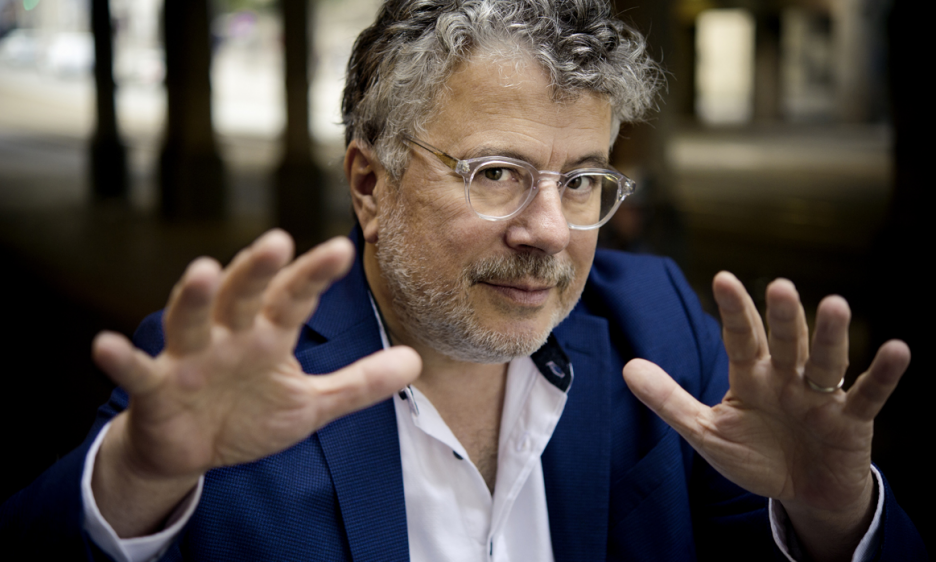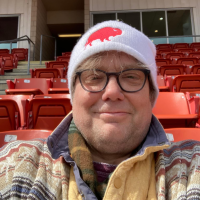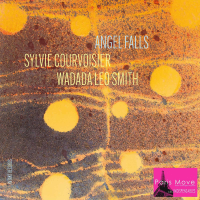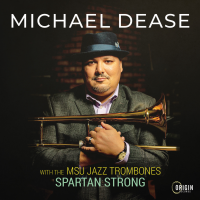Home » Jazz Articles » Interview » Franck Amsallem: A Jazz Life From New York To Paris
Franck Amsallem: A Jazz Life From New York To Paris

If you want your music to have a lasting impact you’ll have to compose.
—Franck Amsallem
The Summer Knows (David Wong, bass and Kush Abadey, drums) includes song the theme song from the 1971 movie "The Summer of '42" composed by French composer Michel Legrand, who won the Academy Award for Best Original Dramatic Score.
Amsallem spoke to me from Arcueil just outside Paris, known as the home of composer Erik Satie.
AAJ: Franck, thank you for talking with me today.
FA: You're quite welcome.
AAJ: Where are you?
FA: I am home, about half a mile outside of Paris, in Arcueil, the city of Erik Satie.
AAJ: Were you born there?
FA: I was born in Algeria, but I am not a pied-noir, nor a colonist. I am part of the indigenous people of Algeria, which is why my name has an Arabic consonance, but in fact it is above all a name borne by the Jews of Algeria and Morocco. In 1962, my family came back to France at the very end of the independence war and settled in Nice, France. That's where I grew up.
AAJ: It doesn't get much more beautiful than the French Riviera.
FA: I grew up on the strip of land between Nice and Monaco. Talk about beautiful! Around the age of 14, I started studying music seriously, and I went to the jazz festival known as the Grande Parade du Jazz (now the Nice Jazz Festival) in 1977. At that moment I became a complete jazz addict.
AAJ: Was there one particular performance at that concert that made you love this music and want to devote your life to it?
FA: The festival was ten days long and I went every night. There were seven sets a night and there was music from Dixieland, which I didn't appreciate, but there was mainstream jazz, there was post-bop jazz . . . Charles Mingus, The Thad Jones-Mel Lewis Orchestra, Count Basie, and Stan Getz were all there. I remember seeing Thad Jones-Mel Lewis, and Count Basie back-to-back. There was a moment where Thad Jones went in and played in the trumpet section with Count Basie. Back in 1977, I was then 15 years old and I could not understand how it was possible to sight-read these charts! Little did I know that he actually wrote a lot of the arrangements, but that didn't matter! I was fifteen years old and I was in heaven.
AAJ: So, you're 15 and you've had your "St. Paul on the Road to Damascus" moment.
FA: That's right.
AAJ: What did you do then?
FA: I had started to play alto sax, and I thought that this was what I wanted to do. I wouldn't say for the rest of my life, but I really wanted to become as good as those people were on stage. And coincidentally at the Nice Conservatory there was a jazz department that had just opened. Of course at that point the French had no experience teaching jazz at all, but I got stuff out of it. There was a good camaraderie between the teachers and the students, and I was a main fixture of that jazz department and that big band for maybe four years till the moment where I won a full scholarship to Berklee College of Music in Boston in 1981.
That was some culture shock. First of all, my English was not really up to par. In Nice, I was a full-time working musician with tons of gigs, a girlfriend and a life. Then I got to Boston and I had to attend a music school that was good but with people a little younger than me. I was considered a student whereas back in Nice I was a well-regarded young pro. But I survived and did pretty good. I became the pianist for Herb Pomeroy's band at Berklee, which was the main showcase big band. I learned a million things playing for Herb and also taking his arranging and composition classes.
AAJ: Did you graduate from Berklee?
FA: Yeah, they called it a "professional diploma." It's for people who are not interested in a four-year degree. I was working a lot in Boston. There were swing bands I used to work with and in some ways it was a better education to be on stage with these musicians who were seasoned professionals and who would call a song in G which you may have only learned in F. The singer is singing and you have to know how to fake it. It's a way better education than a jazz theory class.
In 1986 I studied jazz composition with Bob Brookmeyer at the Manhattan School of Music. I loved New York from the moment I arrived. I loved everything about New York. I loved the way people played and they also liked me. I was never out of work in New York. I still love New York. I love the people, I love the music and, of course, I love the musical experience. Then that same year I had an opportunity, incredibly enough, to become the musical director for the Monte Carlo Casino which was about 10 miles from my home in Nice.
So I put together a fantastic band, all great young professionals. Tim Reis was on tenor, Jim O'Connor on trumpet, Graham Hawthorne on drums, Paul Livant on guitar. We were all in our 20s and we spent four months there. And in 1987 I came back to New York.
AAJ: What was that like? Where were you playing?
FA: Anywhere and everywhere. If you are a musician in New York you play anything anywhere. You play clubs, you play shit clubs, you play great clubs, you play weddings, you play private parties, you play with singers, you do recording sessions, a lot of different stuff. For a while I played a lot of pop music and then I got tired of it, and also things were changing. There were fewer real instruments and more machines and I didn't like it.
I started playing with Gerry Mulligan around 1990 and I recorded my first album, Out A Day (OMD, 1992) with Gary Peacock and Bill Stewart. It is still my best known album. It had several lives. It came out in Japan and had three reissues in Europe.
AAJ: Why did you begin composing?
FA: I believe that if you want your music to have a lasting impact you'll have to compose. You look at Pat Metheny, John Scofield, Keith Jarrett, Chick Corea, Wayne Shorter, Joe Henderson, all these great musicians were or are great composers. So you have to learn how to compose. It isn't easy because there is no formula. In other words, you can't really learn how to compose, especially a short form. You can compose and it can be good or not so good. You take it from there and then you try to improve one composition at a time.
At that point in the late '80s, there was a big emphasis among my friends on presenting original music—this was the very beginning of the bebop revival, which drew on the bebop tradition. That was my main focus for about 10 years on all my recordings, to present a lot of original music.
AAJ: Who are your inspirations?
FA: Small bands—I would say Wayne Shorter, Chick Corea, and some of Pat Metheny . For large bands, Thad Jones, Bob Brookmeyer, Bill Holman, and I'm a contemporary of Maria Schneider and a big fan of hers also. I got to play in her band a few times. That was fantastic. At the end of the '90s, a couple of promoters in Europe asked me to do a standards program. They said, "We love your music but we would like you to play some standards."
AAJ: You mean the American songbook?
FA: Yes. Remember that in New York you have to know how to play standards or else you'll be pouring coffee at Starbucks. So I started recording standards and the first album was an album called Summer Times (FRAM/Sunnyside, 2003). It did really well. There were six standards I think, and three originals. From then on, people really wanted me to record more standards. I moved back to France at the end of 2001 right after 9/11. It was a troubled time in New York and I had just gotten married and my daughter had just been born. A week later we were back in France, on a sabbatical we thought at first.
It was a new life for me. I had to become reacquainted with my French colleagues. I've been based here ever since. I go back to New York once or twice a year.
AAJ: What's it like being a jazz musician in New York compared to Europe?
FA: The life in New York City or in the States is very different than in Paris or anywhere in Europe. First of all, you just need less money to live on in Europe. New York is frighteningly expensive at this point. Everything is closer in Europe. I can be anywhere in Europe with a short plane ride. Each place is distinct. The scene in Sweden is very different than the scene in Sicily, and so forth. It's been good. The audiences there are very open and receptive. The level of musicianship may not be, of course, as monstrous as it is in New York but we do have some truly great musicians here also.
AAJ: Germany is a big jazz market.
FA: Germany has a lot of small clubs that don't pay much. So it's kind of difficult unless you can string them together for about a week and basically break even. Unless you land a bigger gig with one of the radios, it's going to be difficult in Germany.
AAJ: Tell me about the jazz scene in Paris.
FA: It's good. There are three or four clubs that give me good opportunities. The musicians are part of the international scene. American players, European players, French players. I'm quite happy here working, at least with small bands. Paris really has one of the highest levels of musicianship of any scene.
AAJ: You talked about the life of a musician in New York where you play everything from a private party to a club to a concert and I've heard that a lot. Is it different in Paris?
FA: It's very different in France. We are indirectly subsidized by the state, which enables us to sustain ourselves without having to prostitute oneself. I do about one hit a week in Paris and one outside of Paris in France or elsewhere and that's it.
AAJ: Tell me about the song "The Summer Knows."
FA: "The Summer Knows" is the title song of "The Summer of 42," a movie that came out in 1971 I believe. The soundtrack was by Michel Legrand and it became a famous hit. It's one of his songs that hasn't been overly covered by jazz musicians. Maybe I'm wrong, but it seems that only two versions come to my mind, one by Freddie Hubbard and one by Sarah Vaughan. And there is a version by Barbra Streisand too so I wanted to cover that song that I always loved. I used to play it when I was playing piano bar in the 70s in France.
I wanted to play with these two musicians, David Wong and Kush Abadey that I heard play with Cecile McLorin Salvant. They were playing a string of concerts with a full orchestra around Paris and I told them, "you guys sounded incredible! We have to do something, let's make a record!" Sometimes musicians say that and nothing comes of it. I said, "get your book out and let's see if we can find two days to record." We only found one day where we could all make a record, in New York. And we did that June 18, 2024 at Samurai Studio in Queens. It has a nice piano, a good engineer, and a good sounding room.
I elected to do it without headphones, just like a concert. You need a good engineer who you can trust and a room that is not too alive but not too dry. And you need musicians who are willing to work like that.
AAJ: What's next?
FA: The Summer Knows (Self Produced, 2025) came out four months ago, so it's still very fresh. I'm still working on getting radios to promote it and promoters to react. I would like to do another album very soon. I would like to do more recordings as a trio because I haven't done that many. As a matter of fact, this is my third trio album (where I don't sing). I may decide to do several different trio albums, one in England, one in Denmark. For now, those are two places where musicians I know live, with whom I love to play and perform.
It's an idea I'm putting together. For the record in England, I will probably play only standards written by English composers and some pop things from British musicians. Maybe a standard or two and a pop song or two.
AAJ: I look forward to that. I thank you for your time today. I enjoyed talking with you.
FA: It was my pleasure.
Tags
Interview
Frank Housh
Franck Amsallem
Out A Day
Gary Peacock
Bill Stewart
The Summer Knows (un été 42)
David Wong
Kush Abadey
Erik Satie
Nice Jazz Festival
Charles Mingus
The Thad Jones-Mel Lewis Orchestra
Count Basie
Stan Getz
Thad Jones
Herb Pomeroy
Bob Brookmeyer
Tim Reis
Jim O'Connor
Graham Hawthorne
Paul Livant
Gerry Mulligan
pat metheny
John Scofield
Keith Jarrett
Chick Corea
Wayne Shorter
Joe Henderson
Bill Holman
Maria Schneider
Summer Times
Michel Legrand
Freddie Hubbard
Sarah Vaughan
Barbra Streisand
Cecile McLorin Salvant
PREVIOUS / NEXT
Support All About Jazz
 All About Jazz has been a pillar of jazz since 1995, championing it as an art form and, more importantly, supporting the musicians who make it. Our enduring commitment has made "AAJ" one of the most culturally important websites of its kind, read by hundreds of thousands of fans, musicians and industry figures every month.
All About Jazz has been a pillar of jazz since 1995, championing it as an art form and, more importantly, supporting the musicians who make it. Our enduring commitment has made "AAJ" one of the most culturally important websites of its kind, read by hundreds of thousands of fans, musicians and industry figures every month.
























